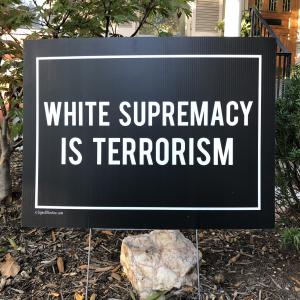 As Donald Trump continues his journey to become the presumptive nominee of the Republican Party, he enjoys support from many disparate groups. As he reminded us after his victory in Nevada, Trump enthusiastically said, “we won with the young, we won with old, we won with highly educated, we won with poorly educated, we are the smartest people, the most loyal people…..and 46% were the Hispanics.” However, there is one group that supports Trump in higher than expected numbers–Evangelicals. “I love the Evangelicals” has been a (re)current and continuing theme throughout his campaign, especially after his endorsement from Jerry Falwell Jr., president of Liberty University.
As Donald Trump continues his journey to become the presumptive nominee of the Republican Party, he enjoys support from many disparate groups. As he reminded us after his victory in Nevada, Trump enthusiastically said, “we won with the young, we won with old, we won with highly educated, we won with poorly educated, we are the smartest people, the most loyal people…..and 46% were the Hispanics.” However, there is one group that supports Trump in higher than expected numbers–Evangelicals. “I love the Evangelicals” has been a (re)current and continuing theme throughout his campaign, especially after his endorsement from Jerry Falwell Jr., president of Liberty University.
Trump’s support from evangelicals has not gone unnoticed. In short, they wonder aloud how Trump is winning the evangelical vote. In a series of what I call “Why Evangelicals Are Supporting Trump” articles, pundits give several reasons. As early as July 2015, a week after Trump announced his candidacy, David Brody of Christian Broadcast Network explained that both Trump and conservative evangelicals both operate in a world of absolutes. “Donald Trump,” he writes, “operates in a world of absolutes: A world of right and wrong; a world of winners (him) and losers (McCain, Perry, etc); a world of put up or shut up (literally). Trump’s world is colored in black and white. There ain’t much grey. And what does Trump get for speaking out so boldly without holding back? Public ridicule.”
He likens this public ridicule to what conservative evangelicals get when they champion their “biblical values” because according to Brody, “their mindset is much the same. It is a world of absolutes.” He writes that conservatives evangelicals belief in the bible as the inerrant word of God, their belief in salvation through Jesus, their beliefs in spiritual warfare (good vs. evil), leads to many of them receiving public ridicule as well. Brody argues that Trump and evangelicals are “breaking bread together because there is this common bond. They like his boldness. They relate to him because when they’ve been bold about their faith they get blasted too. It’s a kinship in a strange sort of way.”
In a story in the Washington Examiner, the writer quotes conservative religious leaders support for Trump because “Trump is tapping into deep-seated anger in America, a nation founded by Christians ‘for the glory of God and the advancement of the Christian faith. “He’s tapping into something at the grassroots, precinct level of America. America is starving for moral, principled leadership. I hope that Donald Trump brings that.”
Others like Trump’s seemly unwavering support to protect Christians. In an interview with the aforementioned Brody, Trump proclaimed, “the Christians are being treated horribly because we have nobody to represent the Christians. Believe me, if I run and I win, I will be the greatest representative of the Christians they’ve had in a long time.”
Back in August of 2015, Daily Beast writer Betsy Woodruff suggested that people should not have been surprised at evangelical support for Trump. She wrote
Turns out, Trump has been courting the evangelical vote for quite some time. The Donald J. Trump Foundation has made donations to evangelical groups like Iowa’s The Family Leader ($10,000 in 2013, PDF), Samaritan’s Purse ($10,000 in 2013, PDF) and the Billy Graham Evangelistic Association ($100,000 in 2012, PDF), according to IRS forms posted on Guidestar.org.
Elizabeth Bruenig at the New Republic argued that evangelicals support Trump because among other reasons, Trump “has been a thoroughgoing antagonist of President Obama, who is in some evangelical imaginations the anti-Christ; he has a certain machismo, which appeals to evangelicals disgruntled with the ‘feminized’ state of our culture; he’s somehow fused issues of religious liberty in America (think lawsuits over wedding cakes) with issues of religious persecution abroad (think ISIS slaughtering Christians and Yazidis).”
Pastor Robert Jeffress wrote on the reason why Trump was doing so well with evangelicals. He suggested that among many things, evangelicals are realists. In a perfect world,” he reasoned, “evangelicals would love a truly born-again candidate who possesses both a maturity of faith and all the requisite leadership skills necessary to solve the nation’s ills. But as they survey the landscape of seventeen possibilities, a majority of evangelicals cannot find one candidate whom they believe possesses both attributes. Further he wrote:
As evangelicals see America careening downward toward a devastating crash, they are willing to bifurcate leadership responsibilities for the well-being of our country. They are looking to the Church to lead our nation to the spiritual renewal that we so desperately need, but a growing number are searching for a president who has both the leadership skills and tenacity to solve our country’s practical problems such as the immigration dilemma and our economic stagnation.
Gary Scott Smith writing for Newsweek contends that its the overall message that Trump delivers that evangelicals find appealing. “Various pundits conclude,” he writes, “that evangelicals (and many other political and social conservatives) find Trump’s blunt, bold statements—including his willingness to stand up to the hostile, secular media—and his messages to be attractive, especially his strong criticisms of the Republican establishment and Obama’s approach to immigration and foreign policy. Their sense of alienation from the mainstream political process also fuels evangelicals’ support of Trump.”
He argues that “most evangelicals, of course, like Trump’s pro-life position and opposition to same-sex marriage. They also resonate with Trump’s promises to defend the religious liberty of Christians and to fight to keep Christianity from being further removed from the public square.” In short, he believes that evangelicals “see Trump as a strong leader who could help restore America’s place in the world (he continually pledges that he will “Make America Great Again”), preserve traditional values and increase their safety and prosperity.”
One conservative blogger offered his reason for evangelicals support of Trump. He wrote:
Christians have interests that go beyond gay marriage and abortion. We don’t require a Republican candidate who constantly quotes Scripture. Liberals have this image of America where everyone is divided into their little groups: blacks over here, women over there, Hispanics, evangelicals, Southern white men, and so on. The truth is that most people don’t go through life wearing these labels. They make for convenient stereotypes when conducting polls or writing up feature stories, but they are largely mythical. Among conservatives, there is perhaps no greater fundamental ideal than that of individualism. We don’t want to transform the country into some kind of puritanical dictatorship. And while there has been a significant effort to erase America’s Christian roots, no one believes that a President Huckabee or a President Cruz is going to magically turn back 20+ years of cultural degradation. We do believe, however, that the right guy with the right message might be able to break up some of the blatant corruption that has consumed Washington D.C. At a time like this, that’s more than enough.
Ben Domenech at the Daily Beast suggests that for evangelicals believe they are now living in a post-apocalyptic world. He argues that much if what evangelicals hold near and dear has been taken away from them. About this he writes:
In this post-apocalyptic environment, it becomes increasingly clear why Southern evangelicals would drop their requirements that a political leader who seeks their backing be one of them, ideologically or faithfully. They have different priorities now: They want an ally who will protect them, regardless of his personal ethics. That’s why Trump has been able to peel away so many evangelicals as his supporters, despite being an unchurched secularist with three wives who couldn’t tell a communion plate from an offering basket. It is because of the increasingly large portion of evangelicals who believe the culture wars are over, and they lost.
Much however, of the analysis explaining why Trump is doing so well with evangelicals center mostly on political reasons than religious ones. Indeed, it is as if conservative evangelicals separate their “faith” commitments from their political ones. Some have already notice this. In fact, there were those early on that thought Trump had disqualified himself from attracting evangelicals when he said that he had not asked God for forgiveness. This led to one conservative evangelical to write Trump an open letter to explain just how forgiveness works. One New York Times writer disparaged Trump’s support in evangelical circles when he wrote, “as for Trump, I must not be watching the same campaign that his evangelical fans are, because I don’t see someone interested in serving God. I see someone interested in being God.” One simply wrote that when voting starts, conservatives will “wise up.”
As time went on, others doubted Trump’s continued support from evangelicals. Jonathan Merritt writing for the Atlantic suggested that it was (then) “too early to say whether Trump can grow his support among conservative Christians and continue to expand it to the broader Republican base……For now, evangelicals need to ask themselves whether Trump’s brashness is enough to make them overlook many of the values they hold most dear.” Russell Moore, president of the Ethics and Religious Liberty Commission of the Southern Baptist Convention, wrote an editorial that simply asked “Have Evangelicals who Support Trump Lost Their Values” while Kirsten Powers called Trump an “Evangelical Scam Artist.”
However, for me, this leads to another more serious questions about Trump’s candidacy. What has the rise of Trump done to exposed the spiritual and theological grounding that makes up the evangelical faith? Why is conservative (white) evangelical faith (still) the norm of what it means to be a person of faith? What I suggest is that the Trump candidacy has open up windows of opportunity for those of us who express different faith expressions and traditions. It also exposes what many of us have known for a long time–that conservative evangelical faith is spiritually bankrupt and theologically vacuous.
To be continued………..
Donate to the Work of R3
Like the work we do at Rhetoric Race and Religion? Please consider helping us continue to do this work. All donations are tax-deductible through Gifts of Life Ministries/G’Life Outreach, a 501(c)(3) tax exempt organization, and our fiscal sponsor. Any donation helps. Just click here to support our work.











